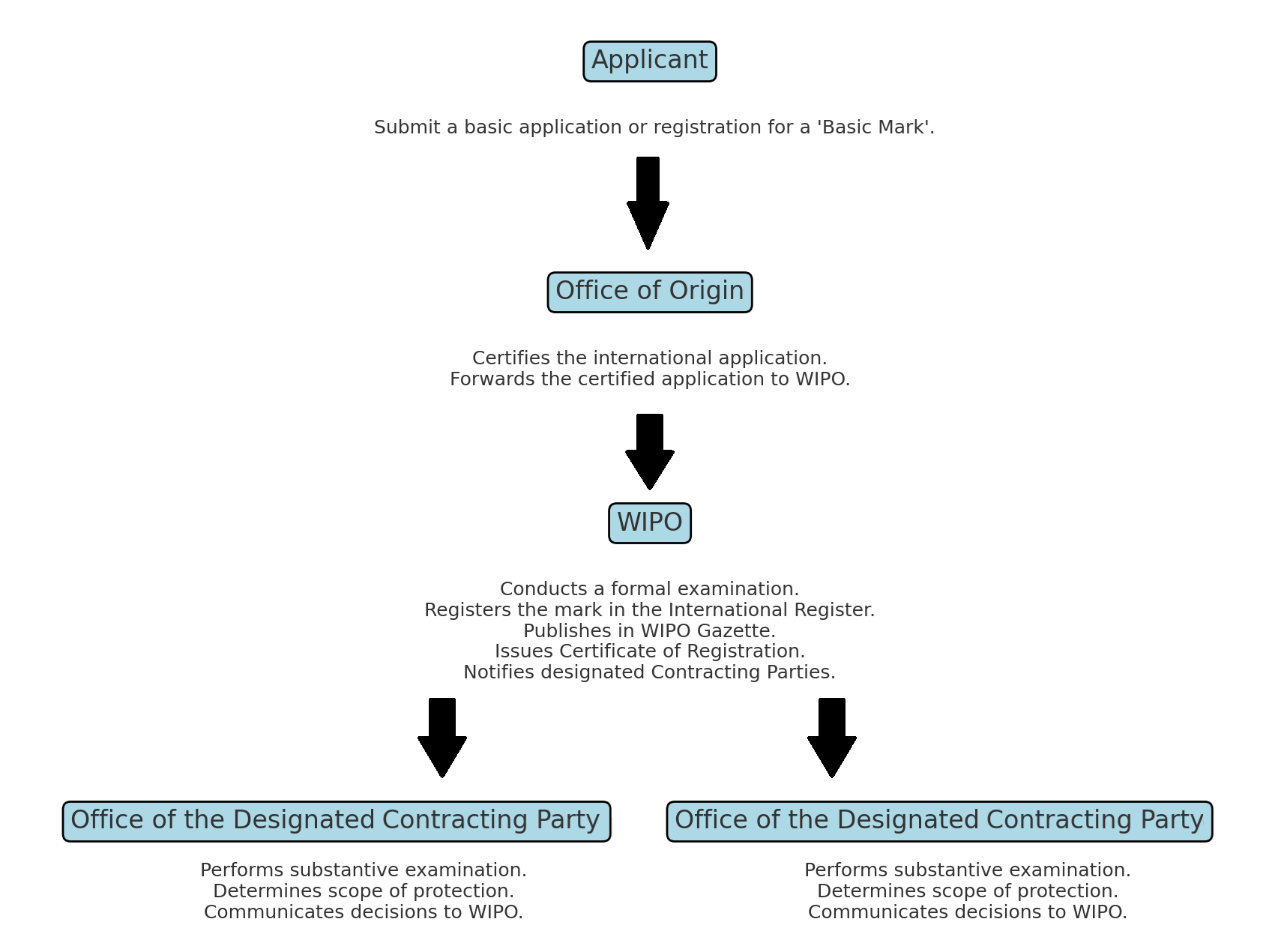In the modern global economy, businesses often seek to expand their markets beyond domestic borders. Securing a portfolio of international trademarks can be pursued in a combination of national and regional trademark applications. Regardless of the jurisdiction, trademarks protect brand identity, providing exclusivity and legal protection against unauthorized use. This article discusses the process of pursuing international and foreign trademark rights, including foreign trademark registration, the role of the World Intellectual Property Organization (WIPO), and the importance of foreign intellectual property protection.
A trademark is a symbol, word, or phrase legally registered or established by use as representing a company or product. Trademarks are critical intellectual property assets for companies of all kinds, helping to distinguish their goods or services from those of competitors. With the globalization of trade, securing trademarks in multiple countries has become more prevalent.

Trademark registration is the process of securing legal protection for a trademark. It provides the owner with exclusive rights to use the trademark in connection with the goods or services for which it is registered. Trademark registration is fundamental to protecting a brand’s identity and ensuring that consumers can distinguish between different products and services in any country in which a company is offering goods and services. The International Bureau of the World Intellectual Property Organization (WIPO) plays a pivotal role in the international trademark registration process. It administers the Madrid System, which simplifies the process of registering trademarks in multiple countries. By filing a single application with WIPO, businesses can seek protection in multiple member states of the Madrid System.
Intellectual property (IP) encompasses various legal rights that protect creations of the mind. These include trademarks, patents, copyrights, and trade secrets. In the context of trademarks, intellectual property rights are essential for maintaining brand integrity and market position in other countries. Protecting intellectual property internationally ensures that a business can effectively compete and grow in the global marketplace.
The Madrid System is an international system for trademark registration. It allows businesses to register their trademarks in multiple countries by filing a single application through WIPO. This system is particularly advantageous for businesses looking to expand their market presence without the complexity of dealing with multiple national trademark offices.
Simplified Process: One application, one set of fees, and one administrative process.
Cost-Effective: Reduces the cost and administrative burden of securing protection in multiple countries.
Flexibility: Allows for subsequent designation of additional member states.
Intellectual property organizations play a central role in the process of securing trademark rights. These organizations, such as WIPO, facilitate cooperation among countries and provide frameworks for the protection and enforcement of intellectual property rights. They also offer resources and support for businesses navigating the complexities of international trademark registration.
The Madrid System operates through the cooperation of its member states. These countries have agreed to adhere to the rules and procedures established by the system, ensuring a standardized approach to international trademark protection. This cooperation simplifies the process for businesses and helps maintain the integrity of trademark rights across borders.
The process of filing an international trademark application involves several steps:
Domestic Application: Before applying internationally, a business must have a registered trademark or a pending application in their home country.
International Application: The business then files an international application through their national trademark office, which forwards it to WIPO.
Examination by WIPO: The International Bureau examines the application for compliance with formal requirements and records it in the International Register.
National Examination: The designated countries examine the application according to their national laws.
The process of filing an international trademark application involves several key steps to ensure compliance with the World Intellectual Property Organization (WIPO) requirements. When an application is submitted, it undergoes a formal examination by WIPO to check for sufficient contact details, designation of at least one Madrid System member state, quality of images, and payment of fees. If the application fails to meet these criteria, WIPO issues an 'irregularity notice' to both the applicant and their Office of Origin, outlining necessary corrections to be made within a typically three-month timeframe.
Applicants can respond to irregularity notices directly through eMadrid, an online platform. Once an application meets all formal requirements, WIPO registers the trademark in the International Register, publishes it in the WIPO Gazette of International Marks, and sends a Certificate of Registration. This certificate acknowledges compliance with WIPO's formal standards and notifies the member states where protection is sought.
The next step involves substantive examination by the Intellectual Property Offices of each designated member state. These offices have 12 to 18 months to grant or refuse protection for the trademark. Decisions are sent to WIPO, which then informs the applicant and updates the International Register accordingly.
If no news is received within the specified timeframe, protection is granted by default. However, if an office issues a provisional refusal, WIPO forwards this notification to the applicant, including reasons for refusal, necessary steps for response, and options for appeal. In some cases, applicants may need to appoint a local agent. Applicants can appeal provisional refusals at the domestic level, with possible outcomes ranging from a grant of protection for some or all goods and services to a confirmation of total refusal.

While the Madrid System offers significant advantages, businesses may still face challenges in securing international trademark rights. These challenges include:
Varying National Laws: Each country has its own trademark laws and examination procedures, which can lead to inconsistencies and delays.
Oppositions: Third parties in the designated countries may oppose the registration of a trademark, leading to legal disputes.
Maintenance: Maintaining registration requires monitoring deadlines and complying with renewal requirements in each country.
To navigate these challenges, businesses should consider the following strategies:
Comprehensive Search: Conduct thorough searches to ensure the trademark is available in the target countries.
Professional Guidance: Engage with intellectual property attorneys who specialize in international trademark law.
Monitor and Enforce: Regularly monitor the use of the trademark in other countries and take action against infringements.
The landscape of international trademark registration continues to evolve. Emerging markets, technological advancements, and changing legal frameworks all influence the process. Intellectual property organizations like WIPO are continually working to improve and streamline the system, making it easier for businesses to protect their trademarks globally.

Securing international and foreign trademark rights is a complex but essential aspect of global business strategy. Through systems like the Madrid System and the support of intellectual property organizations, businesses can navigate the intricacies of trademark registration in multiple countries. By understanding the process and leveraging available resources, businesses can protect their brand identity, ensuring long-term success in the global marketplace.

"Partnering with Mark Miller at Sierra IP Law is one of the smartest choices I could have made in the world of bringing a new invention to market. He is extremely responsive, knowledgeable, and professional. I could never have conceived of the areas he has advised me on and covered in attempting to write a patent on my own. He and his team have not only insured that my Intellectual Property Rights are well protected, but they have advised and recommended additional protections that I could not have thought of otherwise. I highly recommend Sierra IP Law to anyone looking for a strong and trustworthy legal partner."
Fraser M.

Sierra IP Law, PC - Patents, Trademarks & Copyrights
FRESNO
7030 N. Fruit Ave.
Suite 110
Fresno, CA 93711
(559) 436-3800 | phone
BAKERSFIELD
1925 G. Street
Bakersfield, CA 93301
(661) 200-7724 | phone
SAN LUIS OBISPO
956 Walnut Street, 2nd Floor
San Luis Obispo, CA 93401
(805) 275-0943 | phone
SACRAMENTO
180 Promenade Circle, Suite 300
Sacramento, CA 95834
(916) 209-8525 | phone
MODESTO
1300 10th St., Suite F.
Modesto, CA 95345
(209) 286-0069 | phone
SANTA BARBARA
414 Olive Street
Santa Barbara, CA 93101
(805) 275-0943 | phone
SAN MATEO
1650 Borel Place, Suite 216
San Mateo, CA, CA 94402
(650) 398-1644. | phone
STOCKTON
110 N. San Joaquin St., 2nd Floor
Stockton, CA 95202
(209) 286-0069 | phone
PORTLAND
425 NW 10th Ave., Suite 200
Portland, OR 97209
(503) 343-9983 | phone
TACOMA
1201 Pacific Avenue, Suite 600
Tacoma, WA 98402
(253) 345-1545 | phone
KENNEWICK
1030 N Center Pkwy Suite N196
Kennewick, WA 99336
(509) 255-3442 | phone
2023 Sierra IP Law, PC - Patents, Trademarks & Copyrights - All Rights Reserved - Sitemap Privacy Lawyer Fresno, CA - Trademark Lawyer Modesto CA - Patent Lawyer Bakersfield, CA - Trademark Lawyer Bakersfield, CA - Patent Lawyer San Luis Obispo, CA - Trademark Lawyer San Luis Obispo, CA - Trademark Infringement Lawyer Tacoma WA - Internet Lawyer Bakersfield, CA - Trademark Lawyer Sacramento, CA - Patent Lawyer Sacramento, CA - Trademark Infringement Lawyer Sacrament CA - Patent Lawyer Tacoma WA - Intellectual Property Lawyer Tacoma WA - Trademark lawyer Tacoma WA - Portland Patent Attorney - Santa Barbara Patent Attorney - Santa Barbara Trademark Attorney